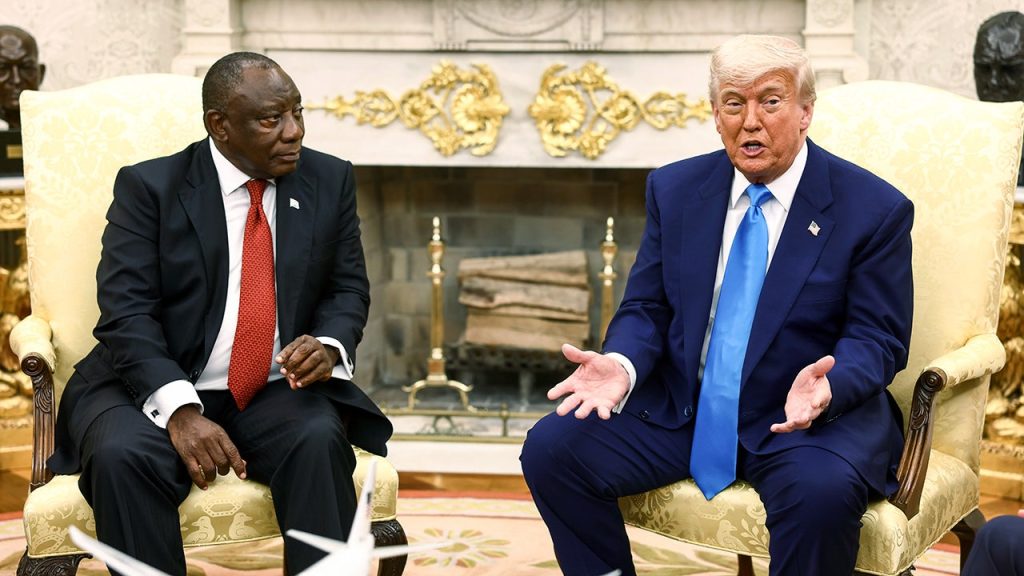In a recent Oval Office meeting, President Donald Trump confronted South African President Cyril Ramaphosa with critical statements regarding the alarming rates of violence in South Africa, particularly against farmers. The meeting unmasked the government’s perceived inadequacies in addressing the rampant crime, which has escalated to staggering levels, alarming both national and international observers. Analysts suggest that Trump’s intervention may shine a critical light on these issues, prompting the South African government to take more decisive action against violence that has plagued the nation.
| Article Subheadings |
|---|
| 1) Overview of the Violence in South Africa |
| 2) Trump’s Meeting with Ramaphosa: Key Moments |
| 3) South African Government’s Response to Crime |
| 4) International Perspectives on South Africa’s Situation |
| 5) Future Prospects: Can Change Happen? |
Overview of the Violence in South Africa
The issue of violent crime in South Africa has reached alarming proportions, with statistics reflecting a stark reality. Recent police reports reveal a staggering number of murders averaging 6,953 in just three months. This alarming statistic translates to 76 individuals being killed every single day, prompting significant concern among citizens and analysts alike. The murder rate, which has averaged around 40 homicides per 100,000 residents since the fall of apartheid in 1994, is strikingly higher than the global average of roughly 4 per 100,000. This disproportionate rate indicates a severe public safety crisis that affects all demographics within the nation.
Trump’s Meeting with Ramaphosa: Key Moments
During the Oval Office meeting on May 21, President Trump confronted South African President Cyril Ramaphosa about the escalating violence, particularly targeting the country’s farmers, a group historically associated with racial tensions. Trump presented video clips and a dossier of news articles documenting farm murders, emphasizing the urgency of addressing this crisis. This unfiltered presentation of facts was perceived by many observers as a diplomatic ambush aimed at calling out the failures of the South African government. One notable moment included a candid statement from Zingiswa Losi, the president of the Congress of South African Trade Unions, who openly discussed the unchecked nature of crime in rural areas.
South African Government’s Response to Crime
Critics have repeatedly pointed fingers at the South African government for its inadequate response to violent crime. With only 12% of murder prosecutions resulting in convictions between 2019 and 2022, the public has lost confidence in law enforcement capabilities. Analysts, including Frans Cronje, president of the Yorktown Foundation for Freedom, allege that the government has largely failed in its duty to protect its citizens. Observers argue that external pressure from global leaders, such as President Trump, could act as a catalyst for the Ramaphosa administration to acknowledge and address violent crime more effectively.
International Perspectives on South Africa’s Situation
The international community is increasingly concerned about the violence pervading South Africa. Some experts suggest that Trump’s highlights of these issues indicate a growing awareness among international political leaders regarding the safety and human rights landscape in the nation. Analysts like Max Meizlish, of the Foundation for Defense of Democracies, argue that decades of corruption have undermined the South African government’s ability to deliver essential services, making violent crime a significant issue both locally and internationally. Attention has intensified with international laws and trade treaties coming under scrutiny; they may soon include provisions linked to the South African government’s effectiveness in managing crime.
Future Prospects: Can Change Happen?
Looking ahead, both local activists and international observers are calling for improvements in the South African government’s approach to violence and human rights. The recent discourse, spurred by Trump’s attention to the issue, can potentially be harnessed by activists at home to demand accountability and action from their leaders. With the backdrop of a changing political landscape—where the African National Congress (ANC) has lost its majority for the first time since the end of apartheid—there is speculation about the possibility of reforms in law enforcement and governance.
| No. | Key Points |
|---|---|
| 1 | South Africa faces a significant spike in violent crime, averaging 76 murders a day. |
| 2 | President Trump presented alarming statistics about crime during a meeting with President Ramaphosa. |
| 3 | The South African government has faced criticism for its failure to prosecute murder cases effectively. |
| 4 | International leaders are increasingly scrutinizing South Africa’s approach to governance and human rights. |
| 5 | Activists hope that international pressure can lead to meaningful changes in crime management and governance. |
Summary
The alarming levels of violence in South Africa demand urgent attention from both domestic leaders and the international community. President Trump’s direct confrontation with President Ramaphosa serves as a critical reminder of the urgent need for effective governance and law enforcement in South Africa. With significant public and international pressure building, transformative changes to the justice system and crime prevention strategies could be on the horizon, marking a pivotal moment in the ongoing struggle against violent crime in the nation.
Frequently Asked Questions
Question: What are the murder rates in South Africa?
Murder rates in South Africa have reached staggering levels, averaging about 6,953 murders in just the last three months of 2024, equating to approximately 76 murders each day.
Question: Why is Trump criticizing the South African government?
Trump’s criticisms focus on the government’s inability to effectively address violent crime, particularly in relation to the alarming number of murders occurring in rural areas and against farmers.
Question: What impact could international pressure have on South Africa’s crime situation?
International pressure may compel the South African government to take more decisive action in addressing violent crime, enhancing accountability, and establishing effective law enforcement measures.


